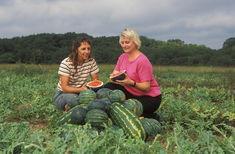
Scientists with the Agricultural Research Service (ARS) have found that, in addition to containing plentiful amounts of the health-promoting antioxidant lycopene, watermelon is an excellent source of the amino acid citrulline.
And ARS researchers in Oklahoma have found that not only are watermelon's citrulline stores abundant, they are also readily usable. Their findings are reported in the current issue of the journal Nutrition.
The human body uses citrulline to make another important amino acid arginine, which plays a key role in cell division, wound healing and the removal of ammonia from the body.
ARS plant physiologist Penelope Perkins Veazie and nutritionist Julie Collins were interested in finding out just how bioavailable watermelon's citrulline is, since the fruit is one of few foods to contain high levels of it. Perkins Veazie works at the ARS South Central Agricultural Research Laboratory in Lane, while Collins previously based at the Lane laboratory works at Eastern Oklahoma State College in Wilburton.
After analysing the arginine levels of volunteers who had recently consumed differing amounts of concentrated watermelon juice, the scientists determined that ingesting the juice increased the volunteers' levels of plasma arginine likely from conversion of citrulline.
Medical researchers are currently evaluating arginine as a possible treatment for high blood pressure, elevated glucose levels and the vascular complications associated with sickle-cell disease.
If such studies pan out, concentrated forms of watermelon could represent an all-natural amino acid source.



